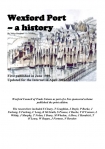Disembarkation- by Nicky Rossiter (motivational books to read txt) 📗

- Author: Nicky Rossiter
Book online «Disembarkation- by Nicky Rossiter (motivational books to read txt) 📗». Author Nicky Rossiter
On May 1st, 1652, the Governors of Wexford and Ross and other port towns were ordered to "impress ships within the ports for the transportation of 1,000 men to foreign portes. " A similar order was made on October 7th to transport 3,000 men.
In the same year, the answer to a petition from inhabitants of Wexford shows the importance of the port.
Among the items agreed were: Buoys and beacons to be provided and fixed at the Bar of the Public charge for the security of vessels coming in or going out of the Harbour; Rules to be issued on the reduction in excise on barrel staves, salt used in the fishery, and fish cured in Ireland and sent from port to port; Directions for landing goods at Dublin to apply to Wexford also; Commissioners of Revenue to consider the necessity of building a Public Quay at Wexford as suggested and to compute the cost thereof. Thomas dark, merchant of Wexford, was granted leave to export 600 tanned hides on October 19th. There were several merchant vessels lying in Wexford Harbour awaiting convoy protection. This was granted on November 30th. At least 80,000 barrels of herring were landed at The Custom House of Wexford in that year.
By the year 1694 trade had increased greatly and outstripped New Ross for the first time in centuries. The Customs Duties for Wexford from December 25th 1693 to December 25th 1694 amounted to £6,851-7-0.
The state of the harbour was causing more concern by 1709. On May 31st of that year a bill "For the opening and Cleansing of the Mouth of the Harbour of Wexford" was laid on the table in the House of Commons. The proposer of the bill, Mr. Cadwallader Edwards expressed concern that the mouth of the harbour, called 'the Barr, ' had become dangerous due to recent violent storms causing it to become shallow. This was a great hindrance to trade and lessened his majesty’s revenue. It was requested that the Grand Jury levy the sum of £250 on the county at large to have the harbour mouth cleansed and a buoy and perch set up. However it is probable that the bill was unsuccessful.
'Oh, wives and mothers, sweethearts sires, well might ye mourn next day; For seventy fishers' corpses strewed the shores of Wexford Bay. "
These lines from a Wexford ballad refer to a disaster that is reputed to have occurred on November 10th, 1762. It is uncertain whether this is fact or legend but it strengthened a long held Wexford tradition of not putting to sea on St. Martin's Eve. The story tells of the hardy seafarers of the port being lured to sea on that forbidden day by the sight of a vast shoal of herring (a fish once copious in their waters but by then in sharp decline). The ballad then relates how 70 of them drowned in the water of Wexford Harbour.
On a lighter note, Wexford was visited in 1764 by a Mr. Amyas Griffith who wrote about the town for the
'Dublin Magazine,' Among the quays mentioned are Ferryboat Quay, Meadow's Quay, Bennett's Quay, Common Quay and Custom House Quay which he says are but half of those present. The Custom House Quay is described as "small, vastly pretty with seats all round, a warm watch house and an excellent custom house with stores. " The quay referred to here was situated at present day Commercial Quay. The Custom House in Wexford was located at different places throughout the town’s history.
The chief exports he noted were corn — about 20,000 barrels annually herrings, beer, beef, hides, tallow and butter. These were exported all over the globe with the major trade to Dublin, Liverpool, Norway, Bordeaux and Barbados. The principal imports were brandy, rums, sugars, wines, dyestuffs, porter, fruit of all foreign kinds, salt, timber and hops.
He concluded his report with the remark "Wexford is as celebrated for its fine women as for its beer and oysters. "
In February, 1787 a petition was sent from Wexford to Parliament.
"That in this and other sea ports great inconvenience and much damage arises to the Inhabitants as well as to Strangers resorting thereonto, from the want of proper regulations for Coal Measures and Coal Porters, from the want of proper regulations for cars and carts plying for hire and for preventing the excessive price of coal sold in small quantities to the Poor, for want of proper regulations in the Market for Bread, Flesh Meat and other Articles and for want of proper regulations for cleaning the streets and keeping them free from Dung, Rubbish, Filth and other obstructions and for preventing swine from going at large therein.
That your petitioners conceive that if such of the Laws enacted for the cities of Dublin and Cork as relate to these matters were extended to all sea ports great benefit and advantage might acrue therefrom.
Signed, Ebenezer Jacob, Mayor
B. Bayly and John Eustace, Baliffs.
Thomas Jones, Town Clerk. "
This document gives some idea of the conditions prevailing in the Port of Wexford in the late 1700s.
There must have been frequent short measures and overcharging for goods and services with the poorer classes being cheated when seeking small measures of provisions. The clause referring to swine indicates that animals frequently roamed the streets.
Among the ships frequenting Wexford Port at that time were:
'Polly' owned by M. Fortune, carried a cargo of coal.
'Lively' owned by Griffley was in ballast.
'Molly' owned by Lewis carried culm (coal dust).
'John' owned by Rack (Reck) had a cargo of coal.
'William Margaret' owned by Leary was in ballast.
'Adventure' owned by Hays carried corn.
'Catherine Sally' owned by Scallan also had a cargo of corn.
In May 1789 another Bill was placed before parliament aimed at improving the Town and Harbour of Wexford.





Comments (0)